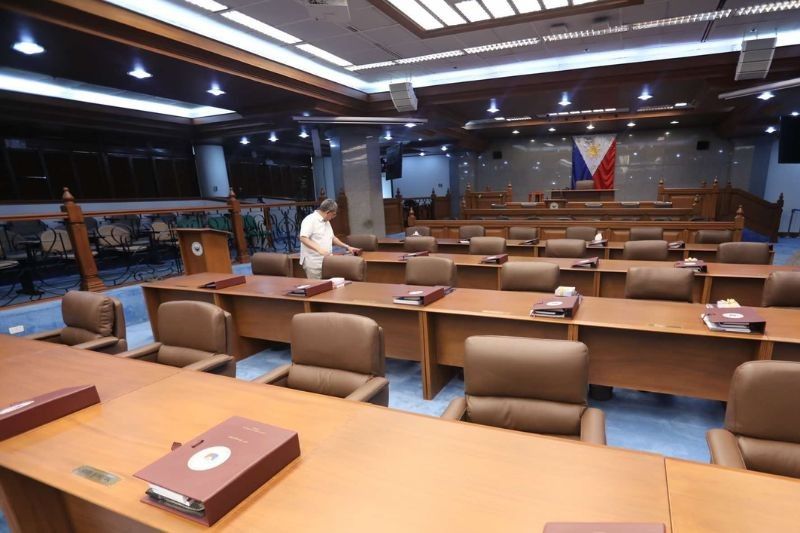
Upgrade to High-Speed Internet for only ₱1499/month!
Enjoy up to 100 Mbps fiber broadband, perfect for browsing, streaming, and gaming.
Visit Suniway.ph to learn
MANILA, Philippines — Some lawmakers have called on the Department of the Interior and Local Government (DILG) to investigate sister city agreements between Philippine and Chinese local governments, citing national security concerns.
House Resolution 39, filed on July 9, seeks to have the DILG review sister city agreements with China and recommend changes to the policies that govern such arrangements.
Several cities and local government units in the Philippines have established sister city agreements with Chinese counterparts, subject to the oversight of the DILG.
Davao City, for example, has agreements with Tai’an City, Jinjiang City in Fujian province, Nanning City in the Guangxi Zhuang Autonomous Region, and the municipality of Chongqing.
Other Philippine cities and provinces with sister city ties to China include Baguio, Manila, Cebu, Quezon City, Lipa, Nueva Ecija, Leyte, Albay and Laguna.
Mention of influence operations
The resolution specifically directs the DILG to evaluate potential risks of “malign interference and influence” in cities and provinces across the country.
The term was used by the National Intelligence Coordinating Agency (NICA) during a Senate probe into illegal offshore gaming operators or POGOs to describe efforts to manipulate public opinion and government policy through targeted information and disinformation campaigns.
The House resolution cited a 2024 Ateneo Policy Center study that discovered Chinese interference attempts increasingly focused on manipulating the Philippines’ electoral, legislative and sub-national governance processes.
In a November 2024 Senate hearing, NICA recognized the ongoing foreign interference in the Philippines, including what it described as a “malign influence” from China.
NICA Deputy Director General Francisco Ashley Acedillo said that the growing Chinese economic engagement in the country has paralleled the spread of espionage and criminal activity.
POGO issue
Illegal POGOs were among the examples, as investigations found some were tied to Chinese nationals and engaged in criminal activities such as scams and human trafficking.
Alice Guo, the dismissed mayor of Bamban, Tarlac, has also been accused of being a Chinese national involved in espionage, following her connection to POGO activities in the area.
One of the clearest examples of Guo’s alleged links to the POGO industry is through Zun Yuan Technology Inc., a POGO hub which she granted a business permit to during her time as mayor.
Her network appears to extend further as she is reportedly connected to Duanren Wu, incorporator of Whirlwind Corp., a real estate firm that leased property to the now-defunct Lucky South 99 — a POGO operation in Pampanga flagged for illegal activities.
During Senate hearings, lawmakers uncovered that Guo had business ties to an illegal gambling syndicate with known links to POGOs. Her own real estate company, Baofu Land Development, has also been dragged into controversy, allegedly playing a role in similar operations.
Acedillo said the surge in Chinese business and criminal activity in the Philippines also coincided when China enacted its 2017 National Security Law, which required full cooperation with the state.
What sister city agreements are for
Under the DILG’s 2024 amended guidelines, sister-city and town-twinning programs aim to promote mutual understanding, goodwill and cooperation in areas such as culture, trade and investment.
Lawmakers, however, warned that China may be using these arrangements to further its personal national security interests, especially with maritime disputes over the West Philippine Sea.
Since the ruling, the Philippines has been the subject of disinformation, with some narratives attempting to discredit the 2016 arbitral victory and falsely depict the country as the instigator in incidents involving Chinese vessels.
“These reports of China’s ‘pervasive’ malign foreign interference and influence require deeper investigation, and must include a comprehensive assessment of risks and vulnerabilities of China’s direct engagement with our local government units,” the resolution read.
The lawmakers also pointed out that the current policy framework for sister city agreements lacks clear regulations for comprehensive data collection, monitoring and evaluation.
“While international cooperation remains essential, the State must also guard against undue foreign control or manipulation of domestic policies, institutions and national identity,” the resolution read.
The resolution was filed by Akbayan Party-list Reps. Chel Diokno, Perci Cendaña, and Dadah Ismula, along with ML Party-list Rep. Leila de Lima. It was also co-authored by Rep. Arlene Bag-ao (Dinagat Islands, Lone District) and Rep. Cielo Lagman (Albay, 1st District).

 5 hours ago
2
5 hours ago
2



